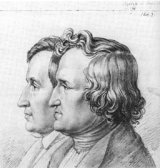The White Snake Page #2
"The White Snake" by The Brothers Grimm is a fantastical German fairy tale. It revolves around a servant who comes into possession of a white snake which grants him the ability to understand the language of animals. With this new ability, the servant embarks on a quest. During the journey, he helps several animals who in return assist him in overcoming perilous tasks, winning the princess’s hand in marriage, and eventually becoming a king himself. This story encapsulates themes of kindness, intelligence, and the cycle of giving and receiving help.
Presently the king’s daughter herself came down into the garden, and was amazed to see that the young man had done the task she had given him. But she could not yet conquer her proud heart, and said: ‘Although he has performed both the tasks, he shall not be my husband until he had brought me an apple from the Tree of Life.’ The youth did not know where the Tree of Life stood, but he set out, and would have gone on for ever, as long as his legs would carry him, though he had no hope of finding it. After he had wandered through three kingdoms, he came one evening to a wood, and lay down under a tree to sleep. But he heard a rustling in the branches, and a golden apple fell into his hand. At the same time three ravens flew down to him, perched themselves upon his knee, and said: ‘We are the three young ravens whom you saved from starving; when we had grown big, and heard that you were seeking the Golden Apple, we flew over the sea to the end of the world, where the Tree of Life stands, and have brought you the apple.’ The youth, full of joy, set out homewards, and took the Golden Apple to the king’s beautiful daughter, who had now no more excuses left to make. They cut the Apple of Life in two and ate it together; and then her heart became full of love for him, and they lived in undisturbed happiness to a great age.
Translation
Translate and read this book in other languages:
Select another language:
- - Select -
- 简体中文 (Chinese - Simplified)
- 繁體中文 (Chinese - Traditional)
- Español (Spanish)
- Esperanto (Esperanto)
- 日本語 (Japanese)
- Português (Portuguese)
- Deutsch (German)
- العربية (Arabic)
- Français (French)
- Русский (Russian)
- ಕನ್ನಡ (Kannada)
- 한국어 (Korean)
- עברית (Hebrew)
- Gaeilge (Irish)
- Українська (Ukrainian)
- اردو (Urdu)
- Magyar (Hungarian)
- मानक हिन्दी (Hindi)
- Indonesia (Indonesian)
- Italiano (Italian)
- தமிழ் (Tamil)
- Türkçe (Turkish)
- తెలుగు (Telugu)
- ภาษาไทย (Thai)
- Tiếng Việt (Vietnamese)
- Čeština (Czech)
- Polski (Polish)
- Bahasa Indonesia (Indonesian)
- Românește (Romanian)
- Nederlands (Dutch)
- Ελληνικά (Greek)
- Latinum (Latin)
- Svenska (Swedish)
- Dansk (Danish)
- Suomi (Finnish)
- فارسی (Persian)
- ייִדיש (Yiddish)
- հայերեն (Armenian)
- Norsk (Norwegian)
- English (English)
Citation
Use the citation below to add this book to your bibliography:
Style:MLAChicagoAPA
"The White Snake Books." Literature.com. STANDS4 LLC, 2025. Web. 22 Jan. 2025. <https://www.literature.com/book/the_white_snake_2103>.




Discuss this The White Snake book with the community:
Report Comment
We're doing our best to make sure our content is useful, accurate and safe.
If by any chance you spot an inappropriate comment while navigating through our website please use this form to let us know, and we'll take care of it shortly.
Attachment
You need to be logged in to favorite.
Log In